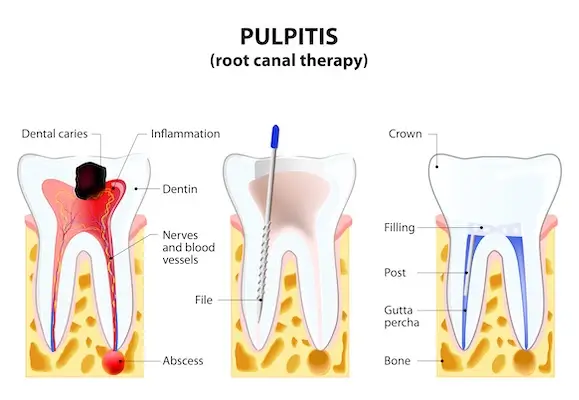Do I Need A Root Canal?
 A root canal is a standard procedure to treat inflammation or infection of the tooth’s sensitive inner pulp tissue, which comprises blood vessels and nerve fibers. Pulp inflammation can result from several causes, including deep decay, cracked teeth, or trauma. While many feel uneasy about a root canal, the treatment is a safe and straightforward way to remove diseased pulp tissue. It is a better alternative to tooth extraction. At times, patients may need to have an extraction and a subsequent dental implant at the extration site. During your initial consultation, Dr. Rocco Mantini will determine the best course of treatment and discuss a treatment plan for your smile.
A root canal is a standard procedure to treat inflammation or infection of the tooth’s sensitive inner pulp tissue, which comprises blood vessels and nerve fibers. Pulp inflammation can result from several causes, including deep decay, cracked teeth, or trauma. While many feel uneasy about a root canal, the treatment is a safe and straightforward way to remove diseased pulp tissue. It is a better alternative to tooth extraction. At times, patients may need to have an extraction and a subsequent dental implant at the extration site. During your initial consultation, Dr. Rocco Mantini will determine the best course of treatment and discuss a treatment plan for your smile.
Reasons For A Root Canal Treatment
The following are some of the most common reasons for root canal therapy.
Deep Tooth Decay
Tooth decay is a bacterial infection where acid eats away the enamel and dentin of the tooth. Suppose you do not treat this decay in its early stages. In that case, it will eventually spread until it reaches the tooth’s pulp. This spreading can result in inflammation and infection of the tooth’s pulp, often pain, and ultimately, death of the tooth. Dr. Rocco Mantini may recommend a root canal for severe tooth decay that has reached the dental pulp. During a root canal procedure, Dr. Mantini will remove the damaged or infected parts of the tooth and all of the diseased pulp, then place medication to clear any active infection. Next, Dr. Mantini will use a rubber-like material to fill the root and seal. Afterward, a filling or crown must restore the tooth to normal chewing function.
Tooth Abscess
Sometimes a pulp infection will spread beyond the root canal system and into your bone and soft tissues surrounding the tooth root. We refer to this infection as an abscess. With an abscess, you may notice pain, swelling, or leave a bad taste in your mouth around the problem tooth. In this scenario, you may need root canal therapy to clear the infection in the tooth and soft tissue and save the tooth. Unfortunately, the only alternative is tooth extraction.
A fractured or traumatized tooth
When a tooth becomes cracked, chipped, or fractured to a point where the tooth’s inner pulp is harmed or exposed to bacteria, a root canal may be necessary.
The need for a root canal procedure will depend on the fracture type or damage and its severity. Dr. Rocco Mantini will be able to evaluate your tooth and recommend the best treatment method. It’s also important to note that sometimes damage or trauma to the tooth can result in pulp death without a fracture in the tooth. Symptoms may include pain or abscess, and you may need root canal treatment.
Multiple restorations of a tooth
Each time your dentist restores a tooth, there will be some trauma to the tooth and pulp. The tooth trauma is especially true for large, deep fillings. Sometimes this can lead to chronic pulpitis, where the pulp is continually inflamed. Over time, the dental pulp can eventually die, and a root canal procedure will be necessary to save the tooth. Furthermore, old fillings or crowns can become damaged or cracked and leak, allowing bacteria from the mouth to invade the tooth’s pulp. This scenario may warrant a root canal.
Endodontic Retreatment
Sometimes, a tooth treated with root canal therapy or another restorative procedure may fail to heal correctly and become painful or infected over months or years following the original treatment. When this happens, Dr. Mantini will need to refer you to an Endodontist for a second treatment to save the tooth that didn’t properly heal. This additional treatment is typically very successful and can diminish pain or discomfort while promoting correct healing.
